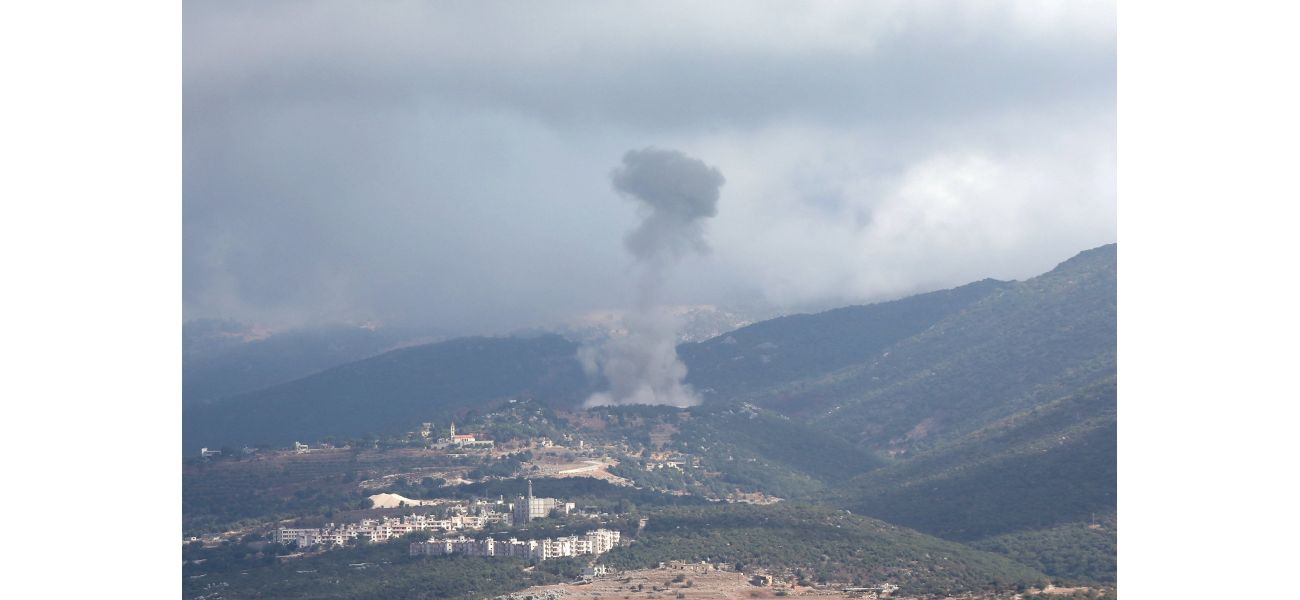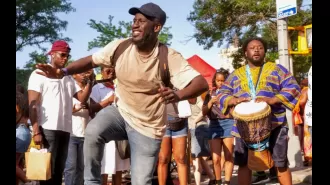Hezbollah launches over 100 rockets at Israel.
"Air sirens sounded in northern Israel, causing many to seek shelter during the overnight attack."
September 22nd 2024.

In the wake of a series of intense attacks, tensions between Israel and Hezbollah have reached an all-time high. Just recently, Hezbollah launched over 100 rockets towards northern Israel, with some landing in the suburbs of Haifa. The attack, which occurred overnight, triggered air sirens across the region and forced thousands of people into bomb shelters for safety. The Israeli military has accused Hezbollah of deliberately targeting civilian areas with their rockets.
As a result of the attack, four people were treated for shrapnel wounds by Israel's Magen David Adom rescue service. One of the injured individuals was a 76-year-old man in Kiryat Bialik, a community near Haifa where cars and buildings were damaged by the rockets. In response to the attack, Israel carried out air strikes on Beirut, which resulted in the deaths of at least 37 people, including one of Hezbollah's top leaders and innocent civilians, including women and children.
The tension between these two sides has been escalating rapidly since a sophisticated attack earlier in the week, which caused multiple devices belonging to Hezbollah to explode. This attack, which occurred on Tuesday and Wednesday, resulted in a wave of violence and destruction, including numerous injuries and fatalities. Smoke can still be seen billowing over southern Lebanon as the cross-border hostilities between Hezbollah and Israeli forces continue.
The explosions caused by the attack resulted in the deaths of at least 37 people, including two children, and injured over 3,000 individuals. Hezbollah has promised to seek revenge against Israel for these devastating attacks, which were widely believed to have been carried out by Israel, although they have not officially confirmed or denied responsibility. In response, the Israeli military has launched multiple strikes across southern Lebanon, targeting militant sites and rocket launchers.
According to Lieutenant Colonel Nadav Shoshani, an Israeli military spokesman, these strikes were necessary to prevent a larger attack from taking place. He stated, "Hundreds of thousands of civilians in northern Israel were under fire. They spent the night and morning in bomb shelters. Today, we saw fire even deeper into Israel than before." This ongoing conflict has resulted in the displacement of tens of thousands of people and has caused numerous casualties on both sides of the border.
Despite neither side seeking a full-scale war, the conflict between Israel and Hezbollah shows no signs of slowing down. In fact, the recent focus has shifted from Gaza to Lebanon, with Israel vowing to bring calm back to the border so that its citizens can safely return to their homes in the north. However, Hezbollah continues to launch rockets towards Israel, with over 100 being fired just last Sunday, hitting the suburbs of Haifa.
Hezbollah has stated that they will only stop their attacks if a ceasefire is reached in Gaza, which has proven to be a difficult feat despite ongoing negotiations led by the United States, Egypt, and Qatar. The situation only worsened when rockets were fired from Lebanon early Sunday morning, forcing Israel to cancel school in the northern parts of the country. On Friday, an Israeli air strike destroyed an eight-storey building in Beirut, killing several Hezbollah members, including Ibrahim Akil, a top official who commanded the group's special forces unit.
According to Israeli defense minister Yoav Gallant, the attack successfully disrupted the group's chain of command while taking out Akil, who was responsible for the deaths of Israelis. Akil had been on the US most wanted list for years, with a seven million dollar reward for his alleged involvement in the 1983 bombing of the US embassy in Beirut and other violent acts during the civil war in the 1980s. However, the strike on the building also resulted in numerous civilian casualties, including women and children, making it the deadliest attack on Beirut since the 2006 war between Israel and Hezbollah.
As a result of the attack, four people were treated for shrapnel wounds by Israel's Magen David Adom rescue service. One of the injured individuals was a 76-year-old man in Kiryat Bialik, a community near Haifa where cars and buildings were damaged by the rockets. In response to the attack, Israel carried out air strikes on Beirut, which resulted in the deaths of at least 37 people, including one of Hezbollah's top leaders and innocent civilians, including women and children.
The tension between these two sides has been escalating rapidly since a sophisticated attack earlier in the week, which caused multiple devices belonging to Hezbollah to explode. This attack, which occurred on Tuesday and Wednesday, resulted in a wave of violence and destruction, including numerous injuries and fatalities. Smoke can still be seen billowing over southern Lebanon as the cross-border hostilities between Hezbollah and Israeli forces continue.
The explosions caused by the attack resulted in the deaths of at least 37 people, including two children, and injured over 3,000 individuals. Hezbollah has promised to seek revenge against Israel for these devastating attacks, which were widely believed to have been carried out by Israel, although they have not officially confirmed or denied responsibility. In response, the Israeli military has launched multiple strikes across southern Lebanon, targeting militant sites and rocket launchers.
According to Lieutenant Colonel Nadav Shoshani, an Israeli military spokesman, these strikes were necessary to prevent a larger attack from taking place. He stated, "Hundreds of thousands of civilians in northern Israel were under fire. They spent the night and morning in bomb shelters. Today, we saw fire even deeper into Israel than before." This ongoing conflict has resulted in the displacement of tens of thousands of people and has caused numerous casualties on both sides of the border.
Despite neither side seeking a full-scale war, the conflict between Israel and Hezbollah shows no signs of slowing down. In fact, the recent focus has shifted from Gaza to Lebanon, with Israel vowing to bring calm back to the border so that its citizens can safely return to their homes in the north. However, Hezbollah continues to launch rockets towards Israel, with over 100 being fired just last Sunday, hitting the suburbs of Haifa.
Hezbollah has stated that they will only stop their attacks if a ceasefire is reached in Gaza, which has proven to be a difficult feat despite ongoing negotiations led by the United States, Egypt, and Qatar. The situation only worsened when rockets were fired from Lebanon early Sunday morning, forcing Israel to cancel school in the northern parts of the country. On Friday, an Israeli air strike destroyed an eight-storey building in Beirut, killing several Hezbollah members, including Ibrahim Akil, a top official who commanded the group's special forces unit.
According to Israeli defense minister Yoav Gallant, the attack successfully disrupted the group's chain of command while taking out Akil, who was responsible for the deaths of Israelis. Akil had been on the US most wanted list for years, with a seven million dollar reward for his alleged involvement in the 1983 bombing of the US embassy in Beirut and other violent acts during the civil war in the 1980s. However, the strike on the building also resulted in numerous civilian casualties, including women and children, making it the deadliest attack on Beirut since the 2006 war between Israel and Hezbollah.
[This article has been trending online recently and has been generated with AI. Your feed is customized.]
[Generative AI is experimental.]
0
0
Submit Comment





